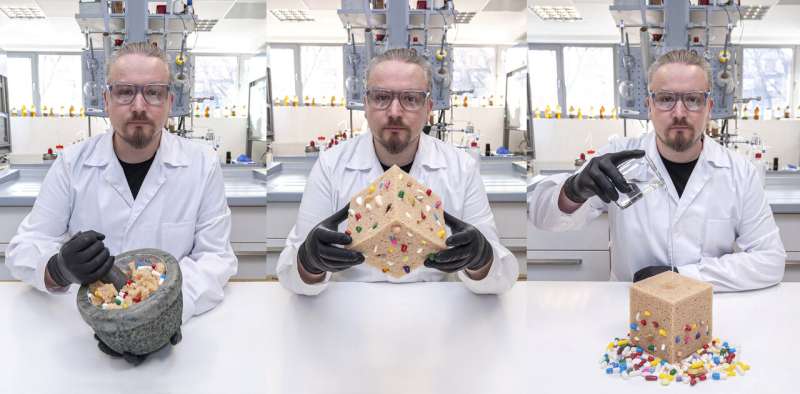A new way to deliver drugs in MOFs

Scientists from the Institute of Physical Chemistry of the Polish Academy of Sciences (IPC PAS) in cooperation with the Faculty of Chemistry of the Warsaw University of Technology (WUT) have developed a new, solvent-free method for the encapsulation of drug molecules in MOF (metal-organic framework) porous materials.
Nowadays, new drug delivery systems for the controlled release of biologically active molecules are instrumental in modern pharmaceutical technology. In recent years, MOFs—a class of organic-inorganic hybrid crystalline porous materials have attracted a great deal of attention as drug carriers due to their amphiphilic internal environment and tunable high and regular porosity. Traditional drug-loading methods rely on the incorporation of a particular drug by soaking an activated MOF in appropriately prepared drug solutions. This seemingly simple procedure is time consuming as it requires many steps such as the synthesis and activation of the MOF, soaking, washing and drying. Furthermore, the loading capacity of the materials obtained in this manner is usually lower than that found in currently used mesoporous silicas or organic carriers.
"What we're looking for is a rational design and synthesis of molecular building units and their controlled transformation into hybrid functional materials in bottom-up processes including both traditional wet methods and environmentally-friendly mechanochemical processes," says Janusz Lewinski, the senior author of the study.
Now, researchers at the IPC PAS and WUT have developed a new and simple solvent-free drug encapsulation method that uses a pre-assembled metal complex incorporating the drug molecule, and this type of cluster acts as both the drug and MOF precursor. According to the researchers, this new approach could both dramatically improve the efficiency of drug encapsulation in MOF materials as well as opening the way to formulating a vast array of "drug@MOF" composites.
"This is a very simple and quick procedure, in which the rapid and solvent-free mechanochemical reaction provides us with a "drug@MOF" composite in just 20 minutes," said Dr. Daniel Prochowicz.
"The solvent-free mechanochemical synthesis is very simple. We need solid precursors and an electric ball mill to carry out the reaction. Then, during the grinding of the substrates, mechanical force does the job for us," says Jan Nawrocki, Ph.D. student in the Lewinski Group and first author of the publication reporting the novel synthetic strategy.
The scientists point out that this proof of concept involving a pre-assembled ibuprofen-functionalized copper cluster is only the beginning of their research into more biocompatible metal clusters based, among others, on zirconium and iron ions.
"The road to bringing MOFs to the pharmaceutical market is probably still long and winding, but when they are ready, our method will be the most favourable from an economic point of view," says Prochowicz.
More information: Jan Nawrocki et al, Development of an SBU-Based Mechanochemical Approach for Drug-Loaded MOFs, European Journal of Inorganic Chemistry (2020). DOI: 10.1002/ejic.201901194
Journal information: European Journal of Inorganic Chemistry
Provided by Polish Academy of Sciences





















